There are a variety of headphone styles and options on the market today. This allows you to find one that fits your needs and works with most types of hearing aids.
Best Headphones for Hearing Aids in 2025
1. Bose QuietComfort 45 Wireless Headphones
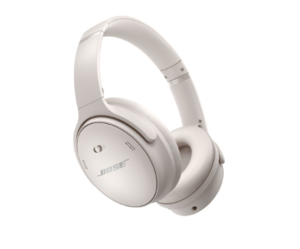
A clear leader in ultra-comfortable wireless over-ear headphones with class-leading noise-canceling that’s perfect for all hearing aid users.
Many customers consider Bose to be the gold standard for listening devices. These over-ear noise-canceling headphones connect to select Bose speakers and soundbars.
Bose also offers an app that you can use to control some of the headphones’ settings.
The Bose Music app is available for Android and Apple devices. The battery on these wireless headphones is designed to last up to 24 hours.
And the multiple microphones with noise-canceling technology provide crisp, clear conversations.
2. Shokz OpenMove Bone Conduction Open-Ear Headphones
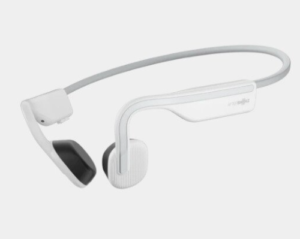
If you wear your hearing aid in your ear or ear canal, bone-conduction headphones may be a good choice. These types of headphones rest against your cheekbones to keep your ears unblocked.
This model is less expensive than other Shokz options, but the company’s bone-conduction headphones have great reviews online.
This wireless model is designed to last up to six hours at a time. It’s also sweat-resistant, so this may be a good option if you’re looking for headphones to wear while exercising. Free shipping, free returns, and a 2-year warranty.
3. Sennheiser RS 135
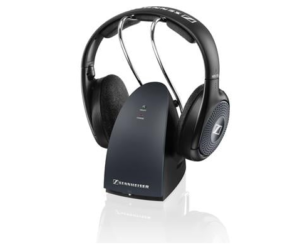
These on-ear wireless headphones are ideal for use over your hearing aids on your TV.
They don’t have Bluetooth connectivity, but they do have a long battery life and a charging cradle, making them a great model for enhancing your TV viewing experience.
They work best with heated earbuds that are completely in your ear canal.
4. Beats EP
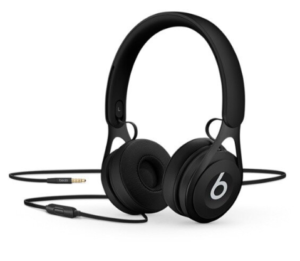
These are for music lovers. You shouldn’t feel like you’re missing out on your favorite songs or compromising on quality.
These on-ear headphones are lightweight, comfortable, and durable. They come in a variety of colors for ultimate personalization.
5. Sennheiser RS135 On-Ear Wireless RF Headphones
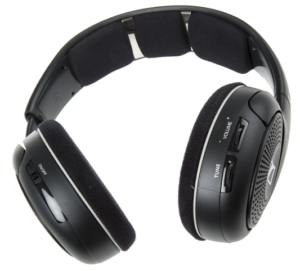
These on-ear headphones feature a charging cradle that plugs into your analog device.
The headphones are wireless, allowing you to watch your favorite TV shows with customizable sound that extends up to 300 feet.
These are a bit low-tech (they don’t have Bluetooth connectivity), but if you want to listen to TV with your headphones to enhance your viewing experience, this could be a great model to try.
6. Astro A50 Wireless Headset + Base Station
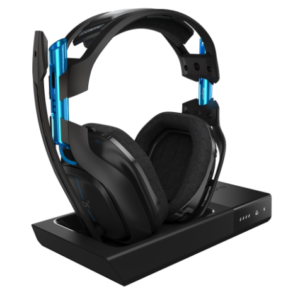
These over-ear headphones make our list because of their high performance and complete control over your audio experience.
While they’re made with gamers in mind, these headphones feature a built-in microphone that delivers clear, directional sound, making them ideal for business meetings or phone calls.
7. AfterShokz Trekz
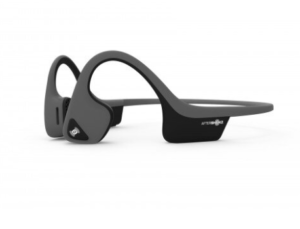
AfterShokz uses bone conduction technology to bypass your eardrum and transmit sound as micro-vibrations to your inner ear.
Since they sit outside your ear rather than inside or on top of your ear, you can comfortably wear AfterShokz headphones with your hearing aid.
These bone-conduction headphones are lightweight, comfortable, and sweat-resistant, making them perfect for anyone who wants to listen to music while on their morning run or early train ride.
No matter what you use them for, these headphones transmit sound through your cheekbones, so your outer ear can still pick up ambient noise.
They also feature Bluetooth connectivity and up to six hours of streaming on a single charge.
8. Shure SE215
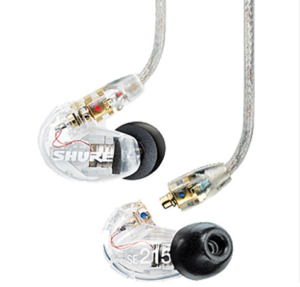
These in-ear monitors (IEMs) work with hearing aids with telecoils to block out ambient noise and provide a comfortable, custom fit.
The ergonomic design is available in a variety of sizes and, is designed with a lightweight shape and optimized nozzle angle to fit comfortably in your ears.
9. Nuraphone Headphones
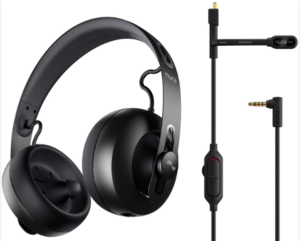
Since no two ears are exactly alike, and we all hear differently within the audio frequency spectrum, Nuraphone headphones adapt to your unique hearing style, making them the ideal choice for those with unbalanced hearing, as if they had a custom audio engineer.
How to Choose the Best Headphones to Use with Your Hearing Aids?
If you’re looking for headphones to use with your hearing aid device, the most important factor to consider, in addition to comfort, fit, connection type, and intended use, is what type of hearing aid you wear.
There are a variety of options to choose from, from wireless Bluetooth to traditional wired and noise-canceling sets, offering full coverage and intuitive controls for ease of use.
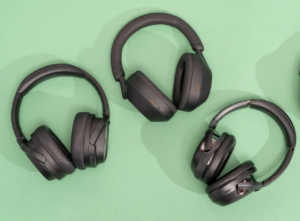
Here are the most common types of headphones that work best with your hearing aids:
Behind-the-Ear (BTE)
Since the main components are located behind your ear, over-the-ear headphones are the best option for maximizing sound efficiency without compromising comfort.
Typically, larger, over-the-ear designs reduce pressure on your ears and block out sound more effectively. In this case, headphones that go into your ear should be avoided, as they prevent your hearing aid from collecting sound.
Receiver-in-the-canal (RIC)
For this type of hearing aid, it is recommended that the headphones completely cover your ear, with at least 1cm of space between the headphones and the hearing aid microphone. This is to prevent unwanted feedback.
Completely In-the-Canal (CIC)
Since these hearing aids are located in the ear canal, you can use earphones that fit inside your ear. This type of hearing aid requires headphones that seal the ear canal to block out ambient sound.
The headphones should fit your ear while still leaving room for the hearing aid.
Personal Sound Amplification Products (PSAPs)
Personal Sound Amplification Products (PSAPs) are amplification devices that can be purchased over the counter without a prescription or a referral from a healthcare professional.
PSAPs are not regulated by the FDA as medical devices, so they are intended for adults with mild to moderate hearing loss.
For more severe hearing loss, over-the-counter hearing aids may not amplify sounds high enough to be helpful.
FAQs
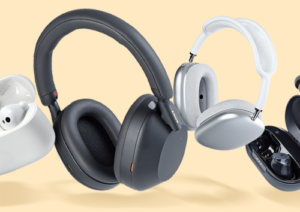
Can I use headphones with my hearing aid?
Yes, you can find headphones that are compatible with your hearing aid. For some people, finding headphones that are compatible with their hearing aids can be difficult because the extra equipment doesn’t fit properly.
Depending on the hearing aid you use, some designs may not fit properly around the hearing aid or maybe too close to the microphone, causing audio feedback issues.
However, with a little experimentation, you can find headphones that work well with your hearing aid.
What are the best headphones for hearing aid users?
When looking for the best headphones for your hearing aid, you want headphones that have enough volume and sound quality.
You also want headphones that won’t whistle when placed next to your hearing aid. Finally, the best headphones for hearing aid users should be comfortable to wear all day long.
After searching the web, I was able to share a few headsets that offer significant benefits to those with hearing loss, and which ones you can consider depending on your budget and needs.
So, here are some headphones that are worth checking out, in no particular order.
The most effective way to find headphones is to choose the right shape. Headphones with round or square ear cups and a width of at least 3.25 inches.
They should be large enough to cover your ears, but not so large that they sit on top of your hearing aids, causing unnecessary feedback.
These headphones are typically used in gaming or music studios, but they can also be used to keep your hearing aids on, provide a better sound experience, and allow you to hear clearly at work and home.
While you may not be able to find hearing aid headphones, these criteria can help.
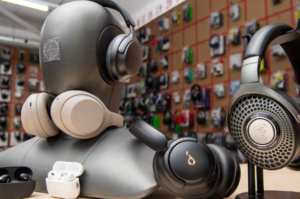
Wireless vs. Bluetooth Headphones: Which is Better for Hearing Aids?
Wireless and Bluetooth headphones each offer their own benefits and features, but which is better for you?
Wireless Headphones: These headphones give you the freedom to move around without being tethered to your device.
They can work well with hearing aids by connecting directly to an audio source via a variety of connection options, such as radio frequency (RF) or infrared (IR).
They often offer a stable connection and strong sound quality, making them a solid choice.
Bluetooth Headphones: Bluetooth technology has revolutionized wireless audio, allowing you to seamlessly connect to multiple devices like smartphones, tablets, and laptops.
This convenience is a huge plus for people on the go. Bluetooth headphones often come with easy-to-use controls, noise-canceling features, and built-in microphones for hands-free calling.
However, there is one catch. Some hearing aid users find that Bluetooth connections can interfere with their devices, resulting in poor sound quality.
Wireless headphones, on the other hand, may not have this issue due to their different frequency range.
So whether you value the flexibility of wireless headphones or the convenience of Bluetooth, it ultimately comes down to personal preference and compatibility with your hearing aids.
By looking at the features of each option and weighing their pros and cons, you can make the choice that best suits your unique needs and enhances your hearing experience.
Are noise-cancelling headphones good for people with hearing loss?
Noise-canceling headphones won’t protect your ears from noise damage, but they can help block out ambient noise.
What headphones do audiologists recommend?
Many audiologists recommend over-the-ear headphones over earbuds. This is because sound is less likely to leak through over-the-ear headphones, which are more sealed. The worse the seal, the more likely you are to turn up the volume to unsafe levels.
Conclusion
Most hearing aid headphone options are recommended for custom hearing aids, but they can also be used with BTE and RIC-style hearing aids.
This requires you to be prepared to wear the headphones at a slightly different angle than usual since the microphones on your hearing aid are not located in your ear canal.
If headphones aren’t your thing, invest in a made-for-iPhone hearing aid that lets you wirelessly stream directly from your iPhone to your hearing aid. You can stream audio from everything from phone calls to videos.
Also read: Best Earbuds for Hearing Aids 2025
